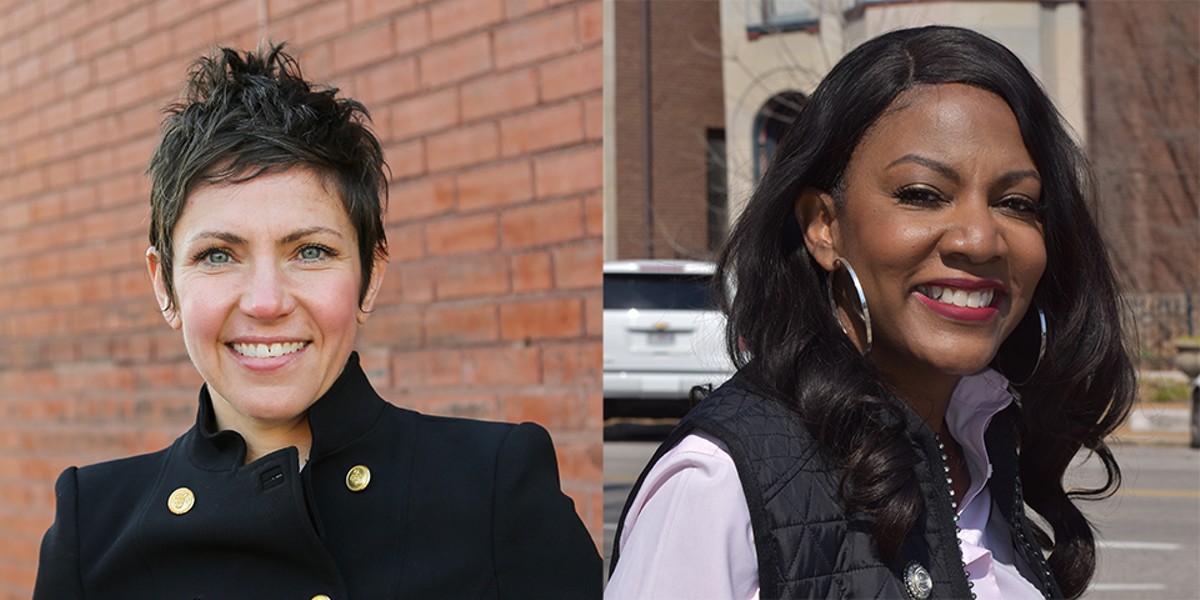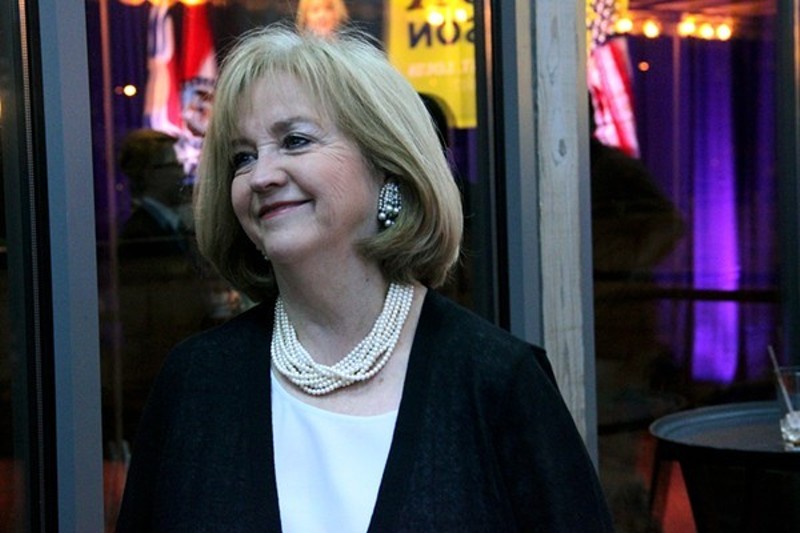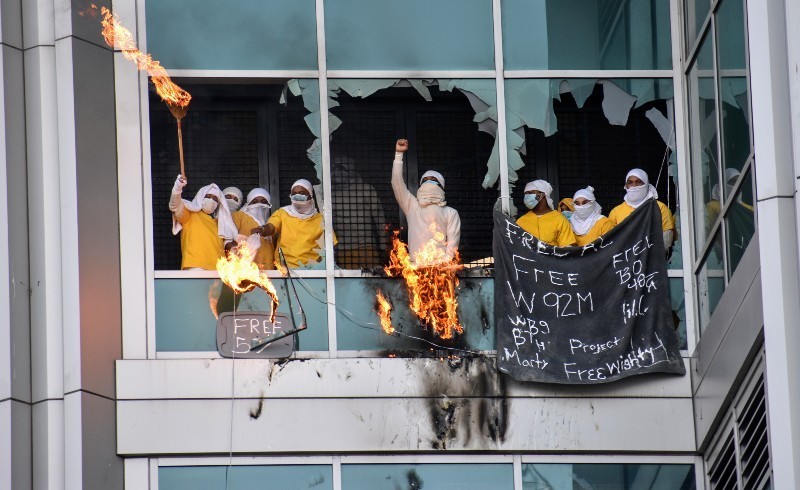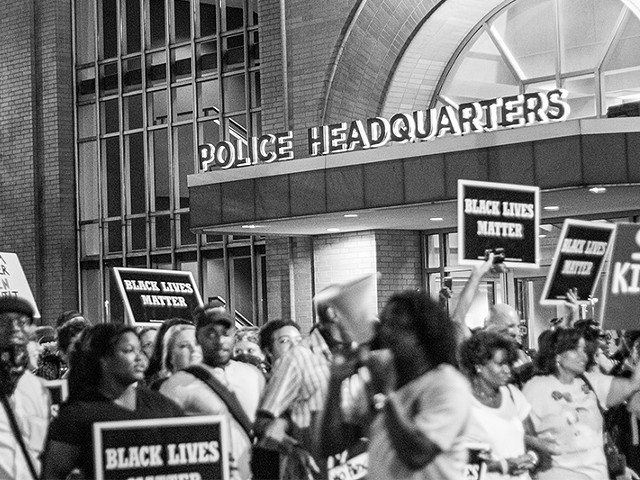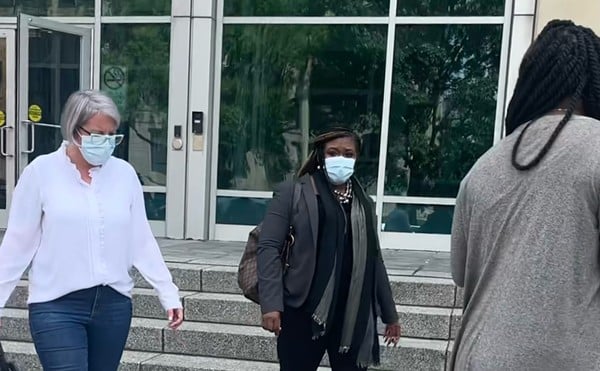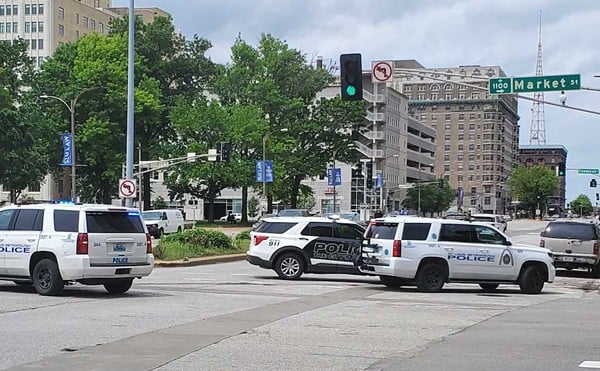We already know several things about St. Louis' next mayor. She is a single mom with a school-aged son in the region's struggling education system. She supports redefining public safety in ways the city's progressives have long dreamed of. She's spent years as part of a city government whose legacy of big promises often crashed into bigger disappointments — and now, in the shadow of that legacy, she is asking voters to believe in her ability to overcome it.
In the broadest strokes, the two candidates on the April 6 general election ballot, Treasurer Tishaura Jones and Alderwoman Cara Spencer, could be placed within a similar area of the city's progressive political spectrum. But the time for broad strokes and abstractions is over.
The winner of the April 6 election will have just two weeks to breathe and prepare before April 20, the day current Mayor Lyda Krewson leaves office for a retirement from politics.
How did we get here? In the four-candidate March 2 primary, Jones placed first and Spencer second in a never-before-tried form of democracy — with voters marking their "approval" of as many candidates as they wished, and the top two moving on to face each other in an equally unprecedented April 6 general election.
For generations, the general election was the part of the process where the drama died, a meaningless round that, in the absence of any serious third-party or Republican challenger, acted as a formality for the winner of the chaotic Democratic primary.
This year, for the first time in the city's history, this traditional formality has been transformed into a very real round two of Jones v. Spencer, and a tangible continuation of their efforts to separate themselves in the eyes of voters. It's a mission they each struggled to accomplish during the primary, as they campaigned not just against each other but against the more moderate sensibilities of Board of Aldermen President Lewis Reed and the pro-police conservatism of Andrew Jones.
Jones and Spencer are not outsiders by any stretch. Spencer has served as 20th Ward alderwoman since 2015. Jones, who was elected in 2012 to the role of city treasurer, owns a political resume stretching back to two terms in the Missouri legislature.
Nothing is certain. Limited polling in the primary that suggested Reed was in the lead turned out to be woefully wrong. On March 2, 47 percent of voters approved of Spencer, shocking some observers with her strong performance. But Jones was clearly the first-place finisher, with 57 percent of voters approving, suggesting she already held a considerable lead across demographics and geography.
So here we are again, in a place that feels eerily familiar to the week before the March 2 primary. The city's homicide rate is still devastating. Its police department is still grappling with brutality and racism. Missouri's vaccine distribution to cities is still working its way up from a level of national embarrassment. The north and south sides are separated by the weight of generations of neglect and the ongoing wounds of crime, disinvestment and vacancy.
But the candidates haven't stayed static. With the distractions of Lewis Reed and Andrew Jones left behind, Tishaura Jones and Cara Spencer have since appeared in multiple debates, refining their positions and clashing in ways that in some instances have revealed how different the two candidates really are.
It's not just the candidates who pushed the line. On March 10, with the primary's dust barely settled, outgoing Mayor Lyda Krewson made an announcement that drastically raised the stakes of the general election — by about $500 million.
On November 18, 2020, three days before the official start of the election season, St. Louis' first female mayor announced that she was done with politics.
Lyda Krewson had turned 68 that weekend. She had spent the previous eight months leading a pandemic-bludgeoned city, and, even before COVID-19 hit, her term in office coincided with mass protests and historic homicide rates. Krewson had barely beaten Jones in a seven-candidate primary in 2017, and now thanks to "approval voting," there was no chance for a similarly split-vote victory.
For Krewson, it was time to move on. That day, at a press conference that would instantly remake St. Louis' political landscape, she explained that her recent birthday had given her an opportunity to evaluate what she really wanted as she neared 70, and whether that included another campaign season and four years as mayor of St. Louis.
"I'm proud of what we accomplished," she said of her tenure at the top of City Hall. "But elections are about the future."
Yet the future wasn't entirely done with Krewson. She stayed out of the primary politics and made no endorsements, but she was still mayor on March 10, when a Democratic-led Congress passed the American Rescue Plan: The plan called for a half-billion-dollar trove of relief funds earmarked for St. Louis.
Krewson's announcement of the relief package sent yet another shockwave into the mayoral election. Over the next week, both Jones and Spencer released outlines of their goals and priorities for use of the funding. As for Krewson, she released her own six-page plan for disbursing the money to various city needs and departments, writing that she hoped it would serve "as a starting point for consideration so that the City can urgently move to deploy these transformative and historic resources."
The urgency isn't understated. Economic hardships have hit businesses and employees, landlords and renters, homeowners and people without homes. Underemployed and laid-off workers are struggling to make ends meet, even as eviction moratoriums are lifted.
The relief funds are a rarity in St. Louis: For once, the city won't just be arguing about whether to take money from one program or department to fund another, debating the future of the city's services in terms of what it can do without; it will be money the city can actually use without diminishing something else.
But this won't be Krewson's money to handle. During a KMOV (Channel 4) town hall last week, Jones was asked about Krewson's proposed "starting point" for the funds.
"I think that's really cute," Jones shot back. "She put a plan together as she's leaving office, because she won't get to spend a dime of it. She'll be gone before it gets here."
Indeed, the first batch of funds is expected to arrive in the next two or three months. Still, the fate of those funds won't be the sole decision of the next mayor. During a March 23 debate, Jones referenced her experience in city government and connections with state and county officials — evidence, she argued, of what would be a capable and responsible regional strategy.
"My priorities are that we need to keep people in their homes," Jones said during the debate. She added that the money could also ensure the city operates multiple mass vaccination sites "where everybody can get a shot locally rather than driving four hours like we've seen recently."
In Jones' plan, some of the money would be used to create an oversight body whose mission would be to track the spending of the vast relief funds across the city and region.
"I would set aside a pot of funds to get community input, because this is a lot of money," she acknowledged. "It can do a lot of good, and we want to make sure we're getting community input on how we can spend the money. Because I don't have all of the answers."
Having an answer for every question has become something of a theme for Cara Spencer's campaign. Days after Krewson released her proposal, Spencer followed up with a "draft investment plan" of her own with hard numbers, including a plan to support 1,000 new home owners with down-payment relief ($15,000 per person) and completing 2,000 home repairs ($15,000 per home). Another proposal would see the city pay as much as $25,000 to "fully rehab" and market thousands of vacant properties owned by the city's Land Reutilization Authority.
Addressing the fate of the $500 million at the March 23 debate, Spencer called it "a once-in-a-century opportunity."
But the money isn't just about COVID-19, and Spencer drew a line between the massive size of the federal aid package and St. Louis' deeper problems. She pointed to her draft proposal to target 65 percent of the funds to north St. Louis, "in areas that have been traditionally disinvested."
"The reason we're receiving so much money," she said, "is that we need to address the long-term issues that have been plaguing our city for decades."
Despite the dramatic mid-campaign entrance of a half-billion dollars, the mayoral candidates have spent their last weeks solidifying themselves around the issue that's long been central to St. Louis' political past and future: public safety.
In 2017, when Jones ran and lost in the crowded mayoral primary to Krewson, the candidates battled over police salaries, the residency requirement for cops and body cameras. They debated whether St. Louis had enough police officers.
Four years later, police salaries have been raised, the residency requirement abolished and body cameras are finally being deployed across the department — but St. Louis' violence hasn't meaningfully changed. If anything, it's worse.
What has changed is the momentum behind policing reform. It is not 2017 anymore: In 2020, the city unveiled its Cops and Clinicians program, deploying mental health specialists along with cops to some 911 calls. Last year also marked the city's rollout of Cure Violence, which aims to use teams of non-police "interrupters" who can better understand and diffuse the tensions of a potential tragedy before it ends in violence.
Throughout the campaign, this momentum for reform has often been addressed in questions about "defunding the police."
Jones has circled closest to this ambitious (and ambiguous) notion. During the primary forum, she fielded a question about the police department's annual budget of $180 million, remarking, "I think it's too much." Later, at a March 16 candidate forum, Jones said she would "totally transform our public safety and police department," and suggested that the department's 130 unfilled officer positions could be staffed with social workers and substance abuse counselors.
"To some, that may look like defunding the police," she said. "But we will be able to deploy those people to the right calls, and that frees up police officers for the right work."
Spencer, too, backs a vision for public safety "beyond traditional policing." Her campaign platform calls for expanding the Cops and Clinicians program and hiring additional social workers to assist the homeless population.
But while Jones leaned into a more nuanced view of what it could mean to defund the police, Spencer distanced herself.
"I think we all know — even the police know — that we can't police our way into safer communities," Spencer said at the March 16 forum. "Rather than defunding the police, recentering our conversation around our policies and around public safety is going to be key here."
That "re-centering" wouldn't mean filling officer positions with social workers, she explained, but would create and expand public safety services "outside the police department."
In reality, St. Louis' next mayor cannot defund the police by herself. But she can, in a way, defund St. Louis' jails by pushing the closure of the ancient Medium Security Institution, known as the Workhouse, and thereby freeing some $8 million for the city budget. Although the Board of Aldermen approved a plan to shut down the Workhouse by the end of 2020, the pandemic and overcrowding concerns have thrown its long-awaited closing into question.
It's not just the Workhouse: St. Louis' next mayor will have to handle two jails in crisis. In February, inmates erupted at the downtown Justice Center, what is supposed to be the city's most secure facility. Local and national audiences watched images of inmates waving signs and burning sheets from the facility's smashed fourth-floor windows. A commission was formed to study the conditions that led to the chaos, but the incident has become yet another spotlight on the city's public safety failures — and on Jimmie Edwards, who for the last four years has been the St. Louis' public safety director, overseeing a swath of city departments, including police and the jails.
During the March 16 candidate forum, Spencer said she wouldn't "talk about personnel," but Jones said flatly that her administration would not include Edwards; Jones explained that she would find a new public safety director through "a national search."
That appeared to be news to Edwards. Two days later, he announced that he would resign by the end of the month.
One week after that, in response to a question leveled during a March 23 debate hosted by KTVI (Channel 2), the two candidates clarified their positions on the Workhouse. Jones went first: She vowed to close the jail in her first 100 days.
Spencer's take on the Workhouse was more circumspect. In her response, she said she is "fully committed" to closing the Workhouse but argued that her priority was the safety of the city's jail residents and the guards responsible for securing them. She pointed to the security failures in the Justice Center as reason to delay the closing of the Workhouse "until we get to the real bottom of the structural issues" in both city jails.
She offered a timeline: "I believe it can be done before the end of this year."
St. Louis' next mayor knows many things about the city she leads. Both Jones and Spencer have spent a grueling, unprecedented campaign season in one of the most tenuous and challenging chapters not just in city history, but in any history. There was the pandemic-spurred shutdown of public society, the freezing of the courts, the overnight destruction of tourism, the nursing-home deaths, the shut-in immunocompromised, the loss of regular school year, proms, graduations, weddings — it was, and is, bigger than all of us.
And still, somehow, it comes down to one of two people to lead St. Louis out of it.
In dozens of speeches this campaign season, Jones has often punctuated her points with active references to her experience as city treasurer and state lawmaker, her master's degree in health administration; she describes her ability to "hit the ground running" and how, as mayor, she would "be ready on day one."
"Electing a mayor with executive existing relationships on the local, state and national level and a background in health care is what this moment demands," Jones said in her opening statement during a March 23 debate.
"We don't have time for leadership that has to learn on the job," she continued. "We have half a billion dollars on its way to our city in federal aid. We need a mayor who can disburse these funds with an eye towards equity and the experience to move quickly."
Spencer may have a shorter political resume, but she was no less pointed in her opening salvo at the debate and added several not-so-veiled shots at her opponent.
"St. Louis is in the fight of its life," Spencer began. "We need a leader who will meet this moment of both crisis and opportunity, not with divisiveness, but with grit, unity and hope."
Like Jones, Spencer spoke of the $500 million in federal aid as a possible savior for a city that's spent so much of its recent history in desperate need of saving. The formula that produced that aid, she pointed out, "was calculated based on our poverty, the housing decay and the economic stagnation that has plagued us for decades."
"It's a real testament to the struggles that our city is facing," she added. "And a once-in-a-century opportunity to fix them."
As the days tick down to April 6, and as Jones and Spencer duel in televised debates — now taking place in person, and not just through Zoom or Facebook streams — what has once been an election defined by its candidates' lack of definition is, finally, coming into clarity.
Spencer points to the improvements in the 20th Ward as a path to improving the city, with her role as a uniting force who makes room at the table to hear multiple sides. Jones points to her experience as an executive, but also as a Black woman who has seen St. Louis through the eyes of its most disheartened and disinvested, a ready-made leader who is "ready to serve."
Both women are sprinting for the finish line — and one thing is certain:
Whoever wins won't have much time to bask in her victory.
Because her new job starts in two weeks.

